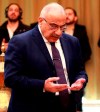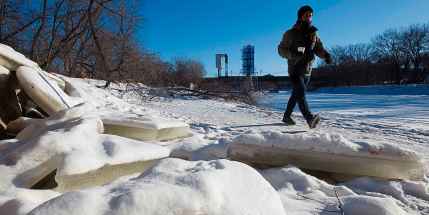Canada must reassess its status in Iraq
Read this article for free:
or
Already have an account? Log in here »
To continue reading, please subscribe:
Monthly Digital Subscription
$0 for the first 4 weeks*
- Enjoy unlimited reading on winnipegfreepress.com
- Read the E-Edition, our digital replica newspaper
- Access News Break, our award-winning app
- Play interactive puzzles
*No charge for 4 weeks then price increases to the regular rate of $19.00 plus GST every four weeks. Offer available to new and qualified returning subscribers only. Cancel any time.
Monthly Digital Subscription
$4.75/week*
- Enjoy unlimited reading on winnipegfreepress.com
- Read the E-Edition, our digital replica newspaper
- Access News Break, our award-winning app
- Play interactive puzzles
*Billed as $19 plus GST every four weeks. Cancel any time.
To continue reading, please subscribe:
Add Free Press access to your Brandon Sun subscription for only an additional
$1 for the first 4 weeks*
*Your next subscription payment will increase by $1.00 and you will be charged $16.99 plus GST for four weeks. After four weeks, your payment will increase to $23.99 plus GST every four weeks.
Read unlimited articles for free today:
or
Already have an account? Log in here »
Hey there, time traveller!
This article was published 06/01/2020 (2165 days ago), so information in it may no longer be current.
Canada and the other countries in the Global Coalition against Daesh (the Islamic State, or IS) are now caught in the middle of a quarrel between the government of Iraq, where most of the anti-IS operations are conducted, and the United States, which provides much of the military muscle.
Canada should try to keep the joint effort going, but should prepare for a quick exit in case Iraq and the U.S. break it up.
The Iraqi parliament on Sunday voted to ask the government to revoke its request for international military aid against IS, an Islamist terrorist organization, and end the presence of foreign troops on Iraqi soil. The vote was provoked by the Jan. 3 U.S. military drone strike that assassinated Iranian Maj.-Gen. Qassem Soleimani near Baghdad airport.

U.S. President Donald Trump replied that if Iraq kicks U.S. troops out, he will make Iraq pay for U.S. military bases in Iraq.
This exchange of threats should lead to a negotiation. Iraq should recognize that it needs the presence of U.S., Canadian and other anti-IS military forces to keep its country whole and its people safe. The U.S. should recognize that it was invited into Iraq to fight IS and that it played a dirty trick on its hosts by making war against Iran on Iraqi territory.
Canada should mobilize its partners in the North Atlantic Treaty Organization and in the Global Coalition against Daesh to press Iraq and the U.S. into an agreement along those lines that will allow the joint operation in Iraq to continue.
It is possible that no such agreement can be reached. The Sunday vote in the Iraqi parliament shows the extent of Iranian political influence in Iraq. Iran is using every available tool to hit back against U.S. economic sanctions, and may do all in its power to get Iraq to kick the Americans and their allies out. If the Americans are driven out, Canadian police and military trainers could not safely remain.
Canada’s interests are best served by a peaceful, stable Iraq that will not be a safe haven for IS nor a happy hunting ground for Iranian agents.
Since the Shia and Sunni populations of Iraq are unwilling to live together or to serve in the same army, that goal is still a long way off. Since the U.S. has once again proven to be an undisciplined, untrustworthy ally, the Global Coalition effort is likely to suffer more clumsy missteps and frustrate its own purposes.
But what other path is open for Canada to advance its interests in Iraq? We must either give up on pulling Iraq together or else work alongside the Americans.
Our first choice should be to try to teach America how to be an ally in a joint operation. That teaching work can never end, because Americans are conditioned to believe that they are tougher and smarter than everyone else and free to make their own rules as they go along. They are not a good ally, but they are the best we’ve got.
Canada’s 850 military personnel on the ground in Iraq, along with police training staff and economic development staff, give this country standing to offer advice to our partners and to take a large role in repairing the damage.
If, however, the Iraqis really want all foreign military forces to leave, we should take the hint.



















